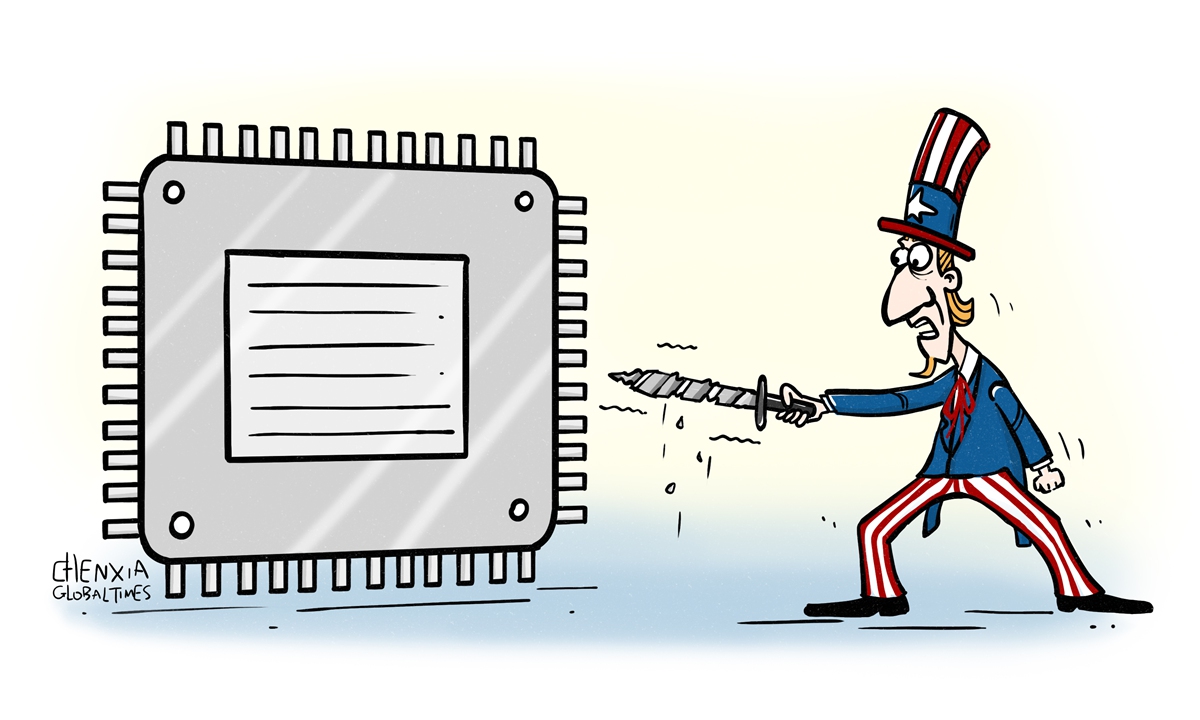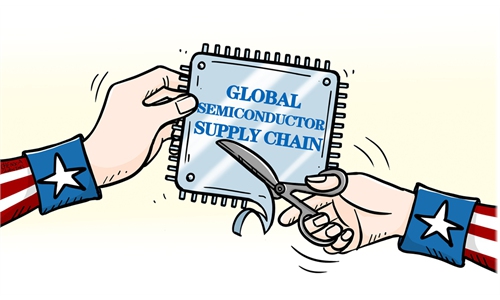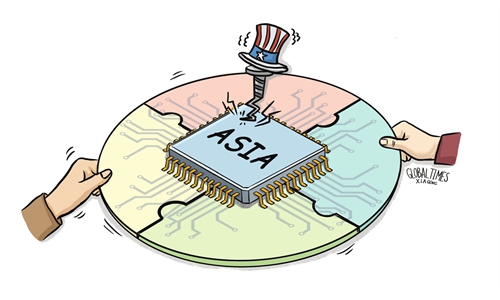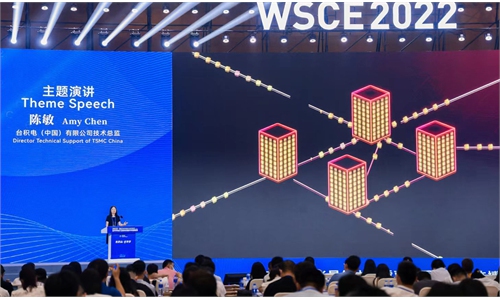
Illustration: Chen Xia/Global Times
The Biden administration has moved to further restrict China's access to advanced semiconductor products and technology, placing seven more Chinese entities of aerospace on its export control list late August, and ordering Nvidia and AMD last week to stop providing high-end artificial intelligence and supercomputing microchips to Chinese companies in Washington's complete disregard for international trade rules.The US government is intent on engaging in a zero-sum game, but as the saying goes: those who seek to block the way of others will only end up blocking their own way. By constantly politicizing and weaponizing trade and economic issues, Washington is only demonstrating to the world's other countries the growing risks of dependence on the US, spurring them to look elsewhere.
And, the US' deepening partisan fight, exacerbating political dysfunction and polarization between have and have-nots in the country is dimming the attraction of the US as a destination for work and study for talented people from across the world, which will ultimately erode the hegemonic power.
American politicians seem to have lost patience as they attempt to impede China's rapid economic and technological progress. Recently, they have gone reckless to thwart China at the cost of diminishing the business of America's own companies. Nvidia admitted in a filing to US Securities and Exchange Commission that barring Chinese customers from buying its advanced chips will cause the chipmaker to lose at least $400 million a year.
To shore up the US' global semiconductor dominance, Washington has lately taken a series of actions to chip away at the distinctive strength and know-how of Samsung and TSMC, the world's leading high-caliber chipmakers.
Also, the US government, following a year's worth of meticulous planning, came out with a new law to heavily subsidize America's private semiconductor manufacturers. Billed as the CHIPS (Creating Helpful Incentives to Produce Semiconductors for America) and Science Act which US President Biden signed three weeks ago, the US law would provide a total of $52.7 billion for American semiconductor research, development, manufacturing and workforce training.
The White House, in a statement, boasts the CHIPS and Science Law will help lower American production costs, strengthen its own supply chain, and at the same time counter China's technology rise. A key provision of that bill imposes limits on advanced semiconductor production in China for all American subsidy recipients.
The Biden administration has yet to establish detailed guidelines for evaluating grant applications, and it is unclear when projects will be financed by the new law. The mainstream American media have praised the act as a measure to help create many good-paying jobs within US shores, while the law will work to "subdue" China's technological advance in the coming years.
Like all recent US legislation meant to address its supply chain anxiety, the most prominent behind-the-scenes driver of the latest actions by Washington is China - or more precisely, fear of China.
So far, the US department of commerce has put as many as 600 Chinese entities on its export restriction list, more than 110 of which have been added since Biden came to office. These 600 entities are the key business players in almost all China's competitive sectors, such as telecom, information, semiconductors, aerospace, supercomputing and AI.
Will the ruthless US assault decimate Chinese scientists' indigenous innovation? The answer is a clear no. Washington's attack will only slow down China's progress in some technology fields in a short time. But China will weather the attack and come out of it much stronger, which has been verified by China's advancements in 4G and 5G information technology, high-speed railway technology, spacecraft launching and in-orbit maneuvering and control technology.
Yes, the US' repressive and coercive actions will only force Chinese scientists and technicians to come up with even greater research, development and innovation efforts to catch up with the world's leading chip manufacturers.
Currently, East Asia, including China's Taiwan and South Korea, lead the US and Europe in critical innovations related to microchips manufacturing. China's mainland market consumes up to 40 percent of global output of semiconductor microchips, which explains why the world's major chipmakers are accelerating their investment in the Chinese mainland because the top market is located here.
Another important factor is China has tens of thousands of well-educated, relatively young, and inexpensive workers, and these advantages cannot be easily found on other continents.
Feeling threatened by the East Asia Chips Prevalence, the Biden administration has been keen since its inauguration to reduce America's dependence on East Asia for a critical technology. To put it in perspective, the US CHIPS and Science Act is a best testament of American calculation and skullduggery.
In addition to weakening East Asia's chips-making capability, the latest string of US actions also reflect the Biden administration's ignominious idea of "decoupling" from China, including Chinese technology and Chinese manufacturing.
The White House said the US will strengthen America's own supply chain and maintain the US' leading status across the industries of future, including robotics, clean technology, quantum computing and artificial intelligence. Aren't Chinese enterprises now leading most of the research and development of these technologies?
For quite a long time, the world has looked to synergy between US and China, including proper coordination on macro and industrial policies and mutually beneficial nature of working together to help preserve stable global industry and supply chains.
However, the Biden administration, concerned and skittish about China's rapid emergence in economic size and global influence, has taken a U-turn, bucking the historic trend of cooperation, and started to contain and hold back China's growth.
Publically, the Biden administration has claimed before the world press that it does not seek to contain China's development, but the claim rings very hollow. In practice, the administration has placed many high-tech Chinese companies, such as Huawei Technologies and SMIC, on the American government's Entity List that bars exports of US technology to the "blacklisted" companies - which Chinese industry watchers call "technological terrorism".
And, by defining China as a strategic competitor, the Biden administration inherited the tariffs war from his predecessor Donald Trump, and moved to intensify the trade war against China. After all, it is American consumers that have borne the brunt of the real-world consequences of their politicians' reckless pursuit of trade and economic decoupling from China.
The author is an editor with the Global Times. bizopinion@globaltimes.com.cn



